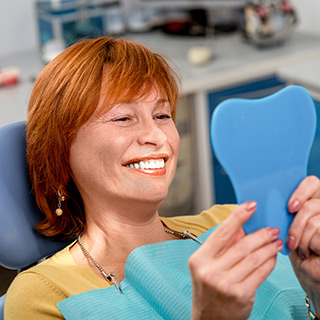
Full Dentures
Modern cosmetic dentures are now far more comfortable and you will be amazed at how many people are wearing dentures without you noticing.
Replacing missing teeth with dentures:-
- enables you to enjoy a healthy diet and smile with confidence
- provides support for your face, which prevents sagging of the cheeks and lips and hinders premature ageing
- improves speech
Conventional dentures can be worn in about 6 weeks after tooth extraction, once the tissues have healed, this means that fewer adjustments are needed.
The advantage of immediate dentures is that the you do not have to be without teeth during the healing period.
Partial Dentures
A partial denture is suitable for patients requiring a number of replacement teeth and who cannot have a bridge due to limited supporting teeth.
Flexible dentures are made with injection-moulded nylon, making the denture almost unbreakable. Integrated clasps ensure great retention of the denture.
Denture Repairs - Loose Dentures
Over time the shape of your gums and jaw can change (bone resorption), causing dentures to become loose.
In addition to the irritation, ill-fitting / loose dentures can result in:-
- ulcers
- tissue overgrowth
- fungal infections
Hard Relining - an impression of your mouth is taken and new acrylic is applied to adapt the fitting surface of your denture.
Soft Relining - liquid polymer is layered into the denture to add cushioning and depth.
Implant Supported Dentures
Implant retained dentures are more comfortable and prevent pressure points commonly associated with standard dentures.
Dental implants are titanium screws set into the jaw. You may require 4 to 8 implants to secure each denture.
The dental implants have special abutments that snap on to the denture. These abutments allow for the removal of the dentures.






